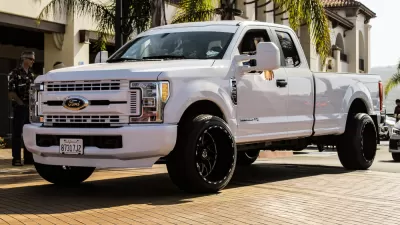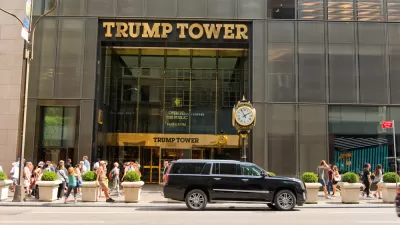D.C. is considering a $500 vehicle license fee for private vehicles over 6,000 pounds.

Washington, D.C. is considering a new law that would add a significant financial disincentive for owning and operating the large pickup trucks and sports utility vehicles that have become so popular in the United States in recent years.
David Zipper reports for Bloomberg that D.C. is “poised to require owners of vehicles weighing over 6,000 pounds to pay an annual $500 vehicle registration fee, almost seven times the cost to register a modest sedan.”
“No other US jurisdiction has created such a forceful financial disincentive against the biggest, heaviest car models,” adds Zipper.
The safety risks of these large private automobiles is clear, at a time when traffic fatalities are increasing across the board in the United States and Americans are spending more and more time behind the wheel of large vehicles.
“Such oversized vehicles exacerbate problems across all kinds of communities, but none more so than dense urban neighborhoods full of pedestrians and cyclists. Driving a large pickup or SUV increases the likelihood you’ll kill or injure someone; its thirsty power plant (the F-250 gets 15 mpg) spews more air pollution and greenhouse emissions,” writes Zipper.
The trend toward massive automobile is so conspicuously harmful that the Onion chimed in back at the beginning of 2020—before the pandemic really amped up the trend.
All of which makes the potential of D.C. charging large truck drivers such a hefty price particularly notable—until the federal government steps in, cities looking too limit the impact of large trucks on streets and communities will have to look for creative forms of disincentive.
“Other state and local leaders alarmed by “truck bloat” would be wise to study the D.C. law, which represents a first-of-its-kind effort to address the negative externalities — or costs borne by others — associated with larger, heavier SUVs and trucks,” writes Zipper.
FULL STORY: A City Fights Back Against Heavyweight Cars

Alabama: Trump Terminates Settlements for Black Communities Harmed By Raw Sewage
Trump deemed the landmark civil rights agreement “illegal DEI and environmental justice policy.”

Planetizen Federal Action Tracker
A weekly monitor of how Trump’s orders and actions are impacting planners and planning in America.

Why Should We Subsidize Public Transportation?
Many public transit agencies face financial stress due to rising costs, declining fare revenue, and declining subsidies. Transit advocates must provide a strong business case for increasing public transit funding.

Understanding Road Diets
An explainer from Momentum highlights the advantages of reducing vehicle lanes in favor of more bike, transit, and pedestrian infrastructure.

New California Law Regulates Warehouse Pollution
A new law tightens building and emissions regulations for large distribution warehouses to mitigate air pollution and traffic in surrounding communities.

Phoenix Announces Opening Date for Light Rail Extension
The South Central extension will connect South Phoenix to downtown and other major hubs starting on June 7.
Urban Design for Planners 1: Software Tools
This six-course series explores essential urban design concepts using open source software and equips planners with the tools they need to participate fully in the urban design process.
Planning for Universal Design
Learn the tools for implementing Universal Design in planning regulations.
Caltrans
Smith Gee Studio
Institute for Housing and Urban Development Studies (IHS)
City of Grandview
Harvard GSD Executive Education
Toledo-Lucas County Plan Commissions
Salt Lake City
NYU Wagner Graduate School of Public Service




























